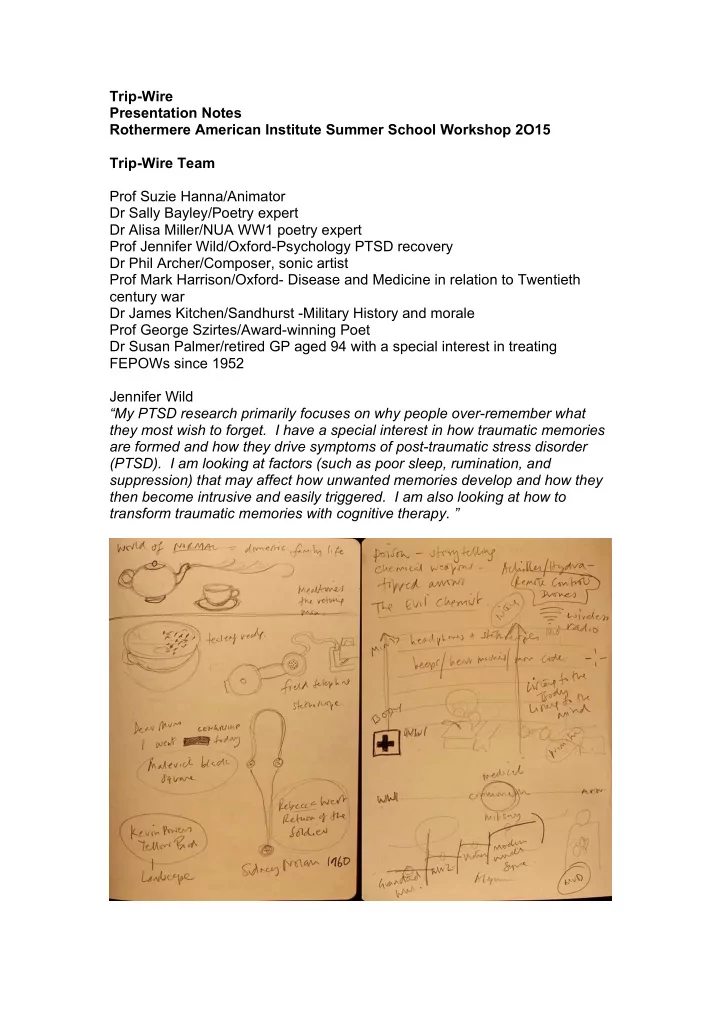

Trip-Wire Presentation Notes Rothermere American Institute Summer School Workshop 2O15 Trip-Wire Team Prof Suzie Hanna/Animator Dr Sally Bayley/Poetry expert Dr Alisa Miller/NUA WW1 poetry expert Prof Jennifer Wild/Oxford-Psychology PTSD recovery Dr Phil Archer/Composer, sonic artist Prof Mark Harrison/Oxford- Disease and Medicine in relation to Twentieth century war Dr James Kitchen/Sandhurst -Military History and morale Prof George Szirtes/Award-winning Poet Dr Susan Palmer/retired GP aged 94 with a special interest in treating FEPOWs since 1952 Jennifer Wild “My PTSD research primarily focuses on why people over-remember what they most wish to forget. I have a special interest in how traumatic memories are formed and how they drive symptoms of post-traumatic stress disorder (PTSD). I am looking at factors (such as poor sleep, rumination, and suppression) that may affect how unwanted memories develop and how they then become intrusive and easily triggered. I am also looking at how to transform traumatic memories with cognitive therapy. ”
Suzie Hanna initial sketches The outcomes of the project will include new poetry, an animated film, exhibition, new ideas for visualising shock and aftershock, roundtables and workshops. Personal The original inspiration was my own Grandfather’s experience in WW1. Ada and Phyllis, my own mother, were left behind in 1914 when my Granddad Jack went to war . This is a photograph of them which he kept in his wallet when he was away establishing postal services/communications trenches and working as a telegrapher on the battlefields in France.
Jack Chambers
Telegrapher, Signals Corps, The Somme. Ypres and then in the army of Occupation in Koln, Germany. He had a very long war. From Osborne House to Wheatfen Broad:Memoirs of Phyllis Ellis p 41 describing my Grandfather. “When my father came home after the war in 1919, it was thought that he would be for an early death. He was in a very nervous state. He never talked much about the war but he had had a very bad time. By the time he came back he had heart trouble and terrible boils, It was obvious that there was no question of any more children.” As a child I spent precious time with him in the toolshed, making little wooden boats. He taught me to hammer nails and plane wood, and to sharpen tools on the emery wheel. He lived in a caravan in the woods, and had previously lived in a shed by the river, known as the ‘bungalow’. At some point he had built a boat and lived on it. Like many old soldiers who suffered shellshock, a return to ‘normal’ domesticity and to work was difficult or impossible. WW1 Poetry Despite intentions to write about his wartime experiences since 1928, it was not until 1937 that artist and Poet David Jones published his first literary outcome, ‘In Parenthesis’ . I have read this book in great detail and am amazed by the atmospheric/sonic lucidity that he achieves, it feels as if you are tuned into an amplifier located on the battlefield and wearing some powerful field glasses. David Jones “In Parenthesis’ p 24 “with exactitude, logarithmic, dial-timed, millesimal – of calculated velocity, some mean chemist’s contrivance, a stinking physicist’s destroying toy” The legacy of WW1 was to celebrate the Glorious Dead, not the injured survivors. They were treated like lepers. A War of Nerves: Soldiers and Psychiatrists in the Twentieth Century by Ben Shephard This amazing, richly informative and courageous book is a study of the way war wounds minds, examining relationships between war technologies and psychological medicine.
The Deluge by David Jones Medicine and War Dr Sue Palmer is my 94 year old Godmother whose work as a GP in Norfolk led her to do a lot of research and work on the welfare and memories of Far Eastern POWs from the Norfolk Regiment many of whom suffered from what is now known as PTSD. I have been recording her speaking about her memories, and what emerges is a snapshot of relevant medical diagnosis and treatment in the Fifties. She has a huge archive relating to her interviews over half a century, … .which will need a home when she passes away.
Soldiers made masks of what their head feels like on the inside, from National Geographic article, February 2O15 ‘The Invisible War on the Brain Healing Soldiers, Unlocking the Secrets of Traumatic Brain Injury ‘ by Caroline Alexander Visual Development for the film I have created a fully operational stop motion puppet based on my Grandfather’s character and am testing the ‘scenery’ as object projections to give an idea of ghostliness, the world of war as a shadow that is always with him, cables and wires, the materials tha he engaged with as a telegrapher which can also be exploited in the sonic track perhaps.
Other testing has been around object metaphor, rearranging matches, inspired by David Jones descriptor of the shellshocked soldier “in his far corner rearrange and arrange again a pattern of match ends” p1O8
‘Mud’ animation is a tactile approach to picturing the WW1 battle field, inspired by my Godmother’s description that her father related to her about his terrible experiences at The Battle of Passchendaele Existing Animations linked to the subject matter Ruth Lingford Pleasures of War https://www.youtube.com/watch?v=xu5d4UsjSkg Oliver Harrison Apocalypse Rhyme http://www.oliverharrison.com/#/apocalypse-rhyme/4563236922 Yuri Norstein Tale of Tales https://www.youtube.com/watch?v=dFSc7aaj2JM Gergely Wootsch, Music Video for Savages ‘Marshall Dear’ http://www.beakus.com/savages/ Max Hattler War http://www.maxhattler.com/war/
Recommend
More recommend